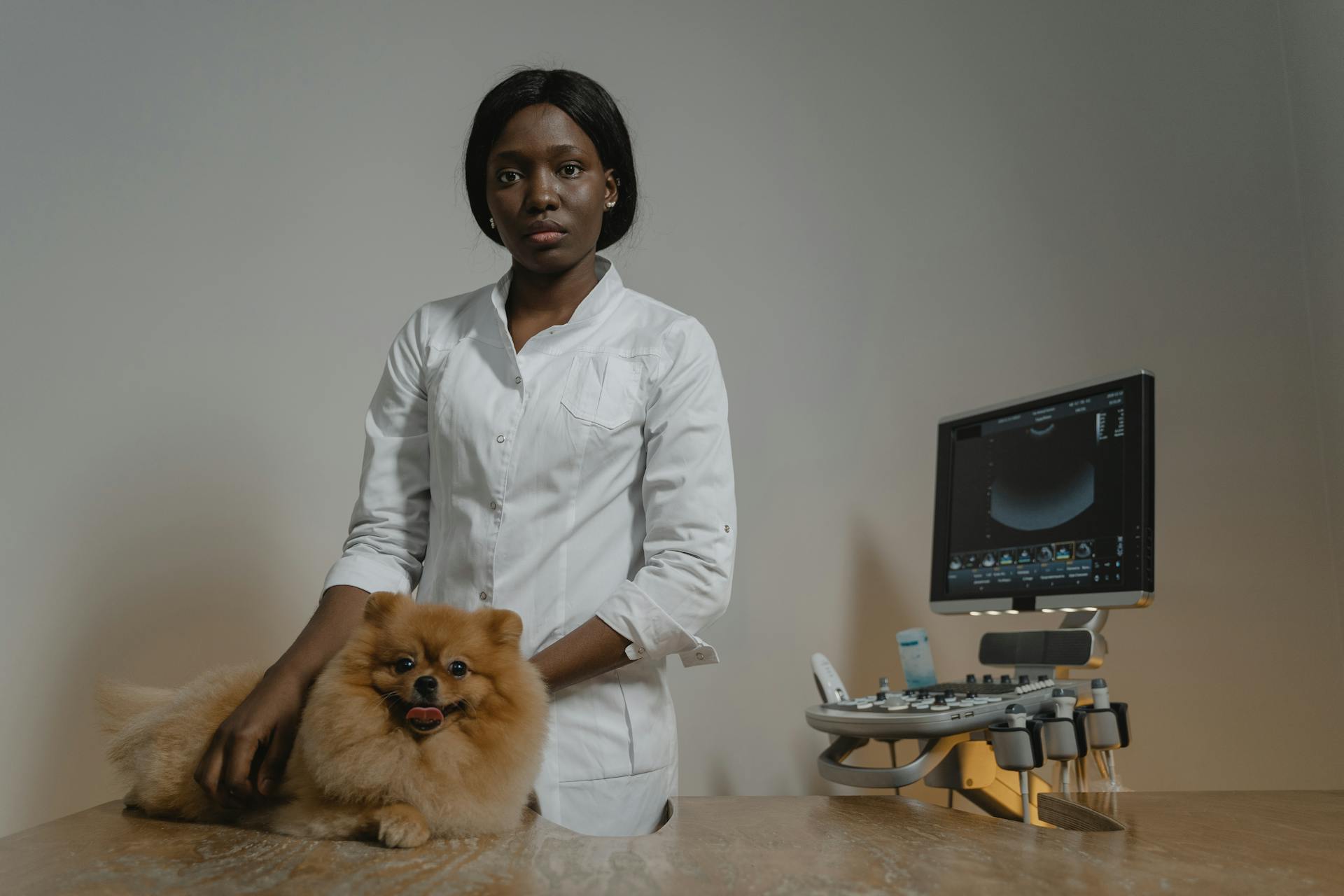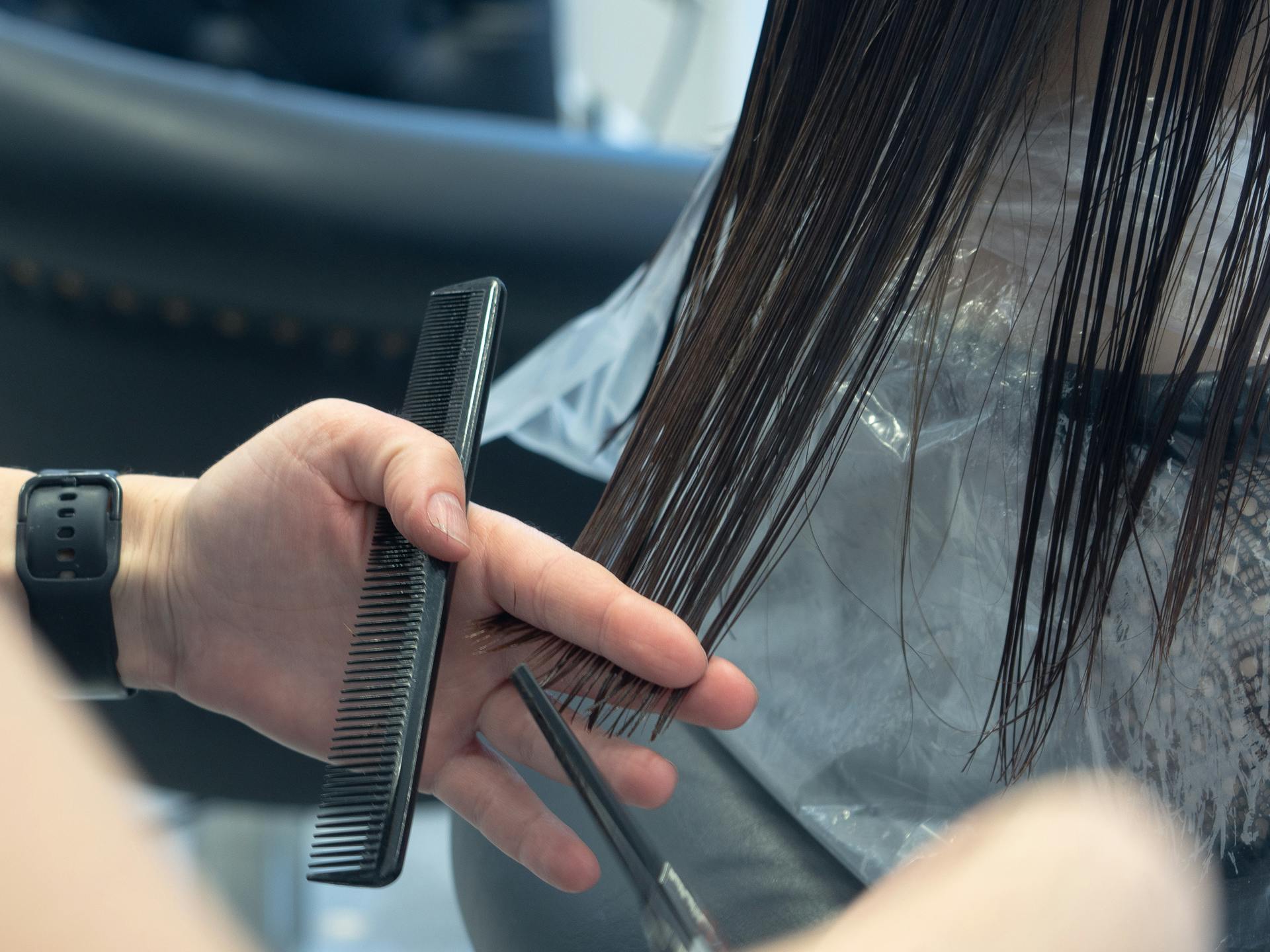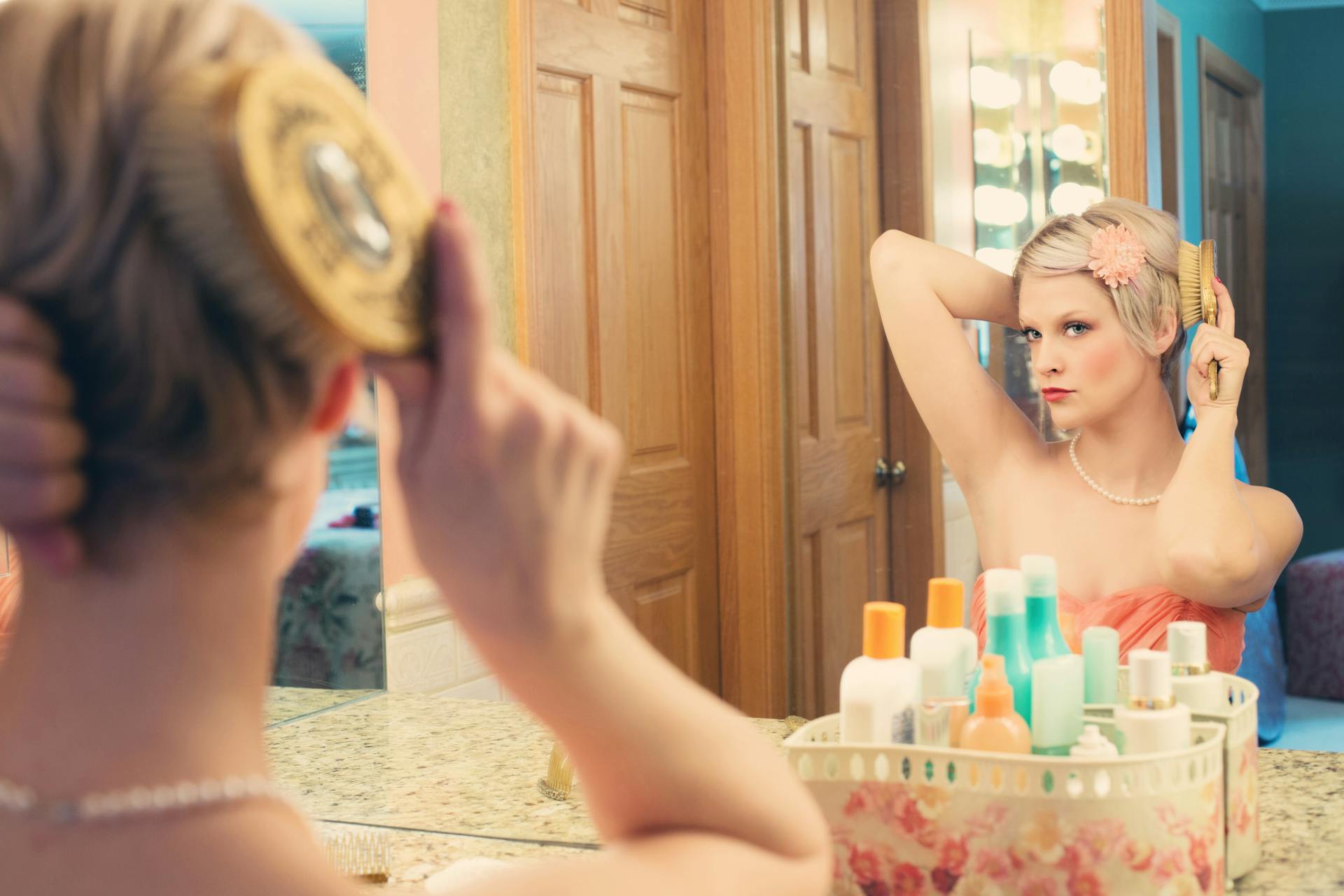
Pomeranians are small but mighty dogs that require regular grooming to prevent matting and tangling of their thick double coat.
Their fur needs to be brushed daily, especially around the neck and shoulders, to prevent matting.
Pomeranians are prone to health issues such as tooth decay and gum disease, so regular dental care is essential.
Regular nail trimming is also crucial to prevent overgrowth, which can cause discomfort and mobility issues.
Pomeranian Health
Pomeranians can live up to 12-16 years with proper care, but they may develop health issues like dental problems, patellar luxation, and hypoglycemia.
Some common eye problems in Pomeranians include dry eye, tear duct issues, cataracts, and distichiasis, which can cause irritation, discharge, and even blindness. It's essential to monitor your Pomeranian's eyes regularly and consult a veterinarian if you notice any changes.
Regular grooming is crucial to prevent tear stains and eye irritation, especially in white Pomeranians. You can use a dog-friendly eye cleaner to wipe away discharge and trim the hairs around your dog's eyes to prevent irritation.
Here's a list of common health issues in Pomeranians:
- Dental problems
- Patellar luxation
- Hypoglycemia
- Dry eye
- Tear duct issues
- Cataracts
- Distichiasis
General Health
Pomeranians are known to live up to 12-16 years, but they can develop some health issues over time.
Dental health is a concern for this breed, so regular dental cleaning is a must.
The most common orthopedic problem in Pomeranians is patellar luxation, where the kneecap slides out of position.
Hypoglycemia, a fast drop in blood sugar levels, can be a serious issue in Pomeranians, especially in small puppies.
Symptoms of hypoglycemia include drowsiness, shaking, fainting, and a drop in body temperature, which can be life-threatening if not treated immediately.
Prep work is essential for grooming, including ear cleaning, nail trimming, and trimming the pads.
Proper ear care is crucial, as some Pomeranians need their ear hair plucked to allow for proper air circulation.
Nail trimming is also vital, as long nails can be uncomfortable for the dog and compromise the shape of the foot.
Trimming the pads of the foot helps give the dog good traction and minimizes dirt tracking.
Anal glands should be checked and expressed if they're full, although some owners prefer to have their veterinarian do this.
Good dental hygiene is essential for a healthy Pomeranian, and regular dental cleaning can help prevent issues.
Consider reading: Pomeranian Dog Health Issues
Eye Problems
Pomeranians can develop several eye conditions, including dry eye, tear duct issues, cataracts, and distichiasis. These conditions can cause discomfort, vision loss, and even blindness if left untreated.
Dry eye is a common issue in Pomeranians, caused by inadequate tear production. This can lead to painful, red, or irritated eyes that cause a dog to squint, blink excessively, or hold their eyes shut.
Tear duct issues can also be a problem, often caused by infection, genetics, inflammation, or other issues that can contribute to tear stains or a narrowing or clogging of tear ducts.
Cataracts in dogs are progressive and can lead to blindness over time. Pomeranians can have a genetic predisposition for cataract development or it can be secondary to diabetes mellitus.
Distichiasis is another condition that can affect Pomeranians, where the eyelashes grow abnormally inward, causing irritation and potentially leading to eye ulcers.
Here are some common signs of eye problems in Pomeranians:
- Cloudy or hazy eyes
- Redness or discharge
- Changes in vision or squinting
- Green or yellow discharge
- Significant changes to the eye or swelling
It's essential to contact your veterinarian if you notice any of these signs in your Pomeranian. Regular eye care and check-ups can help prevent and detect eye problems early on, ensuring your furry friend stays healthy and happy.
A unique perspective: Pomeranian Dog Eye Problems
Nutrition and Feeding: What to Feed
When choosing the right food for your Pomeranian, it's essential to select a high-quality dog food that meets Association of American Feed Control Officials (AAFCO) standards. This ensures your Pomeranian gets all the necessary nutrients.
Talk to your veterinarian to choose the best dog food for your Pomeranian, as they can help you make an informed decision. They'll also advise on the best food for your Pomeranian's life stage: puppy, adult, or senior.
Pomeranian puppies, in particular, require frequent meals due to their high metabolism and lack of fat stores. Feed them multiple times a day, as this will help prevent hypoglycemia.
Adult and senior Pomeranians also need to be fed frequently to prevent hypoglycemia. Feed them at least three times a day, and consider adding antioxidants to their diet to help prevent free-radical damage and slow down aging effects.
To determine how much food to feed your Pomeranian, consult your veterinarian and the feeding recommendations on the dog food bag. Remember to factor in treats, chews, and food toppers to avoid overfeeding and obesity.
You might like: How to Stop Dog from Eating Other Dogs Food
Here's a quick guide to help you get started:
By following these guidelines, you'll be able to provide your Pomeranian with the right nutrition to thrive. Always consult with your veterinarian for personalized advice on feeding your Pomeranian.
Grooming and Hygiene
Pomeranians require frequent bathing and grooming to prevent matting and tangling of their thick, double coat.
Bathing a Pomeranian is an acquired skill that takes patience and perseverance, and it's essential to bathe them as frequently as weekly, but no longer than every 3 weeks, to prevent matting and skin issues.
Brushing is also crucial, and it's recommended to brush your Pomeranian daily to maintain the health of their coat, or every other day if that's more manageable for you.
A good brush technique is needed to avoid missing deeper tangles in the coat and loose hairs, and it's recommended to brush from the skin and outward, away from the body.
Here's an interesting read: Pomeranian Dog Bathing
Using the right tools, such as a firm bristle brush, wire pin brush, or grooming comb, can make a big difference in the effectiveness of your grooming efforts.
Regular dental hygiene is also essential, and implementing routine teeth brushing during your brushing or grooming sessions can help maintain the health of your Pomeranian's teeth and mouth.
It's also important to monitor your dog's skin during grooming for any changes, and talk to your veterinarian if you notice any redness, flakiness, or lumps and bumps.
Maintain Dental Hygiene
All dogs need help maintaining their dental health, and many dogs don't receive routine teeth brushing at home.
This is especially important for Pomeranians because they tend to be prone to developing dental disease.
Use a vet-recommended toothbrush and toothpaste specifically formulated for dogs, as human toothpaste can be dangerous for them.
Brush your dog's teeth every day to prevent tartar buildup and promote good hygiene.
A smaller mouth can lead to overcrowding and trapped food, making it easier for dental disease to develop.
Here's a quick rundown of how to maintain your Pomeranian's dental hygiene:
- Brush your dog’s teeth every day with a vet-recommended toothbrush and toothpaste
- Keep up with professional dental cleanings as your veterinarian recommends them
- Give your Pomeranian dental chews to promote good hygiene
- Feed your Pomeranian a dog food that supports dental health
Skin
Pomeranians can have dry skin, so it's a good idea to talk to your veterinarian about adding fish oil to their diet to help moisturize the skin.
Regular brushing can help prevent skin problems by removing loose hair and reducing shedding.
Monitor your dog's skin during grooming for any changes, and talk to your veterinarian if you notice any redness, flakiness, or lumps and bumps.
Brushing your Pomeranian daily is typically recommended to maintain the health of the coat, but every other day is also suitable if you stick to a routine.
If your dog's coat becomes severely tangled or matted, you may need to consult a professional groomer for help.
It's essential to keep your Pomeranian's skin and coat clean to prevent skin problems, and bathing them properly is crucial for this.
A high-quality shampoo and conditioner specifically formulated for dogs should be used when bathing your Pomeranian.
Make sure your dog is thoroughly rinsed in the bath to avoid leaving any shampoo or conditioner on the skin, which can cause irritation.
Grooming
Grooming is a crucial aspect of Pomeranian care, as their thick, double coat requires regular attention to prevent matting and tangling.
Pomeranians need to be bathed frequently, ideally every 2-3 weeks, to keep their coat clean and healthy. However, over-bathing can strip their coat of its natural oils, leading to dryness and irritation.
To prevent matting and tangling, Pomeranians should be brushed daily, or every other day, depending on their individual needs. Brushing from the skin outward, away from the body, helps break up mats without damaging the coat.
A good brush technique is essential for grooming a Pomeranian properly. Using the wrong type of brush or brushing incorrectly can lead to missed tangles and loose hairs, causing mats or buildup deep in the coat.
In addition to brushing, Pomeranians require regular nail trims to prevent overgrowth and potential health issues. The frequency of nail trims depends on the dog's activity level, diet, and genetics.
Here's a list of essential grooming tools for Pomeranians:
- Firm bristle brush
- Wire pin brush
- Grooming comb
- Nail clippers
- Hand-held shower head for baths
- High-quality grooming products
By following these grooming tips and using the right tools, you can help keep your Pomeranian's coat clean, healthy, and looking its best. Regular grooming also helps prevent health issues, such as skin irritation and dental disease.
Behavior and Training
Pomeranians are intelligent dogs that enjoy learning and do well with training and mentally stimulating activities. They thrive on structure and consistency, making them a breeze to train.
Housebreaking can be a challenge, but it's essential to be patient and consistent. Poms are prone to whining or crying at night as they adjust to their new home, but this behavior will taper off with time and proper care.
Pomeranians love to chew, so it's crucial to "puppy proof" your home and provide a safe exercise playpen to keep them occupied when you're not supervising. This will also prevent them from chewing on cords and table edges.
Poms are naturally curious and love to run around, so it's essential to keep a close eye on them when they're outside. They can escape through small crevices or gaps in fencing, or climb over short fencing, so be cautious of your surroundings when taking them for a walk.
As they grow, Pomeranians will require regular exercise to keep them happy and healthy. A short neighborhood walk or some structured playtime will suffice, but be sure to keep an eye on them to prevent any potential hazards.
Behavior and Training
Pomeranians are intelligent dogs that enjoy learning and do well with training and mentally stimulating activities for dogs. They thrive on structure and consistency, making training a breeze for them.
Housebreaking can be a challenge, so it's essential to be consistent and patient. Consistency and patience are key when it comes to housebreaking a Pomeranian.
Pomeranians should be trained to walk on a lead early on and taught to come when called. They should also be taught not to jump on and off couches or beds, as they can injure their joints or even break a bone.
Readers also liked: How to Train Pomeranian Dog
Puppies may whine or cry at night at first, but this behavior will taper off as they adjust to their new home. Provide your little fur baby with a toy (or two, or three...) to sleep with and a warm bed.
Pomeranians love to chew on cords and table edges, so keep them inaccessible to your puppy when you are not supervising them. Remember to "puppy proof" your home and provide your pup with a safe exercise playpen to stay in when you are unable to supervise them.
Merle Pomeranians must be bred only to non-merle Pomeranians in order to produce healthy offspring. It's vital to test all breeding dogs for the merle gene, as it can be present but hidden in the puppy or adult dog.
Pomeranians enjoy and can excel in canine activities like agility, rally, and obedience, or working as therapy dogs. They are alert and highly intelligent, making them a great fit for these types of activities.
Small Dog
Small dogs can make wonderful companions, but they require special attention to develop into well-behaved pets. Pomeranians, for instance, need positive reinforcement training and socialization to thrive.
Training is key to preventing unwanted behaviors like excessive barking and hyperactivity in small dogs. Pomeranians respond well to positive reinforcement-based training and mentally stimulating activities.
Consistency and patience are crucial when training small dogs. Keep training sessions positive and use rewards to encourage good behavior.
Socialization is vital for small dogs, and it's especially important for Pomeranians. Without proper socialization, they may develop reactive behavior and separation anxiety.
Guide
Training a Pomeranian is a breeze, but housebreaking can be a challenge, so be consistent and patient. They can also make great medical alert dogs.
Pomeranians require regular exercise, but the amount can vary depending on age, health, and individual energy levels.
To keep their fluffy coat free from tangles and matting, Pomeranians need consistent grooming. Regular brushing can help prevent matting and keep their coat looking its best.
Pomeranians are prone to obesity, so calorie intake and weight need to be closely monitored. This means carefully measuring their meals and limiting treats.
Dental health issues can be a concern with Pomeranians, so regular dental cleaning is essential. This can help prevent problems like gum disease and tooth decay.
Pomeranians can be prone to patellar luxation, a condition where the kneecap slides out of position, and hypoglycemia, a fast drop in blood sugar levels. Regular veterinary check-ups can help identify these issues early on.
Here's an interesting read: Why Are Dogs so Careful with Eggs?
Dogs and Children
Pomeranian's are not well suited with small children due to their high energy level and delicate bone structure. Some breeds, like Pomeranian's, require more attention and care around kids.
Some breeds, like Greyhounds, are naturally more laid back and gentle, making them a better match for families with small children. However, it's essential to remember that every dog is an individual and may have its own personality.
Small children can be unpredictable and may unintentionally hurt a dog with their rough play. This is especially true for dogs with delicate bone structures, like Pomeranian's.
Supervising interactions between dogs and small children is crucial to ensure everyone's safety and happiness.
Readers also liked: Dog Breeds Similar to Pomeranian
Frequently Asked Questions
Do and don'ts with Pomeranian?
To care for your Pomeranian, focus on regular oral health, proper grooming, high-quality nutrition, and regular exercise. By following these essential do's, you'll be well on your way to raising a happy and healthy Pomeranian.
Are Pomeranians OK to be left alone?
Pomeranians can be left alone for 6-8 hours a day with proper training, but they require mental stimulation to prevent boredom. With the right care, they can thrive even when you're not home.
Are Pomeranians good house dogs?
Pomeranians are generally well-suited for most home environments, making them a great choice for families and households with children and cats. However, they do require regular companionship to prevent separation anxiety.
Featured Images: pexels.com


